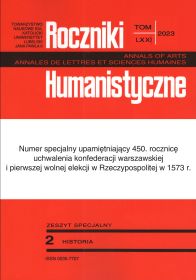Unicka diecezja smoleńska do 1654 r. Przyczynek do dziejów polityki wyznaniowej w Rzeczypospolitej czasów Wazów
Uniate Diocese of Smolensk Until 1654. A Contribution to the History of Religious Policy in the Polish-Lithuanian Commonwealth of the Vasa Times
Author(s): Andrzej GilSubject(s): History, Modern Age, 16th Century
Published by: Towarzystwo Naukowe KUL & Katolicki Uniwersytet Lubelski Jana Pawła II
Keywords: Smolensk land; Chernihiv-Seversk land; Vasa dynasty; religious policy; Uniate Church
Summary/Abstract: The occupation of the new lands in the east of the Commonwealth, sanctioned by the peace of Deulin and Polanov, provided the subsequent rulers of the Vasa dynasty with an incentive to pursue their own religious policies there. The specific legal location of the new provinces of Smolensk and Chernihiv-Siversk allowed them to introduce their own visions of the religious organisation of the local communities. The local nobility was granted the privilege of professing only the Catholic religion in both rites: Western and Eastern. Therefore, the Uniate Archdiocese of Smolensk was established to influence the religiosity of the local Orthodox population in the spirit of the teaching of the Catholic Church. By the way, a cultural reorientation towards the West, represented at that particular time by the Baroque staffage, was also to take place. At the time of the belonging of these lands to the Commonwealth, the eparchy was headed by three bishops: Sergius, Lev Kreuza and Andrzej Kwaśniński Złoty. To a certain extent, their ministry had the desired effect, for despite great efforts after the re-occupation of these lands by Russia, it failed to fully eradicate Western influences in local society and in the cultural landscape the latter created. All this was the result of the religious policy of the monarchs of the Vasa dynasty, who acted both deliberately and by taking advantage of the religious and cultural unification processes then taking place on the European continent.
Journal: Roczniki Humanistyczne
- Issue Year: 71/2023
- Issue No: 2S
- Page Range: 163-181
- Page Count: 19
- Language: Polish

